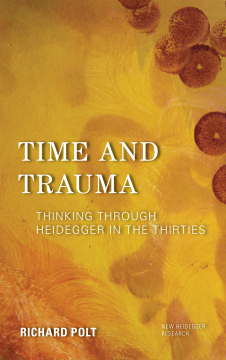
Additional Information
Book Details
Abstract
In this important new book, Richard Polt takes a fresh approach to Heidegger’s thought during his most politicized period, and works toward a philosophical appropriation of his most valuable ideas. Polt shows how central themes of the 1930s—such as inception, emergency, and the question “Who are we?”—grow from seeds planted in Being and Time and are woven into Heidegger’s political thought. Working with recently published texts, including Heidegger’s Black Notebooks, Polt traces the thinker’s engagement and disengagement from the Nazi movement. He critiques Heidegger for his failure to understand the political realm, but also draws on his ideas to propose a “traumatic ontology” that understands individual and collective existence as identities that are always in question, and always remain exposed to disruptive events. Time and Trauma is a bold attempt to gain philosophical insight from the most problematic and controversial phase of Heidegger’s thought.
Polt’s reading of Heidegger is a meticulous, original, and admirably nuanced reconstruction and critique of Heidegger’s ill-fated engagement with the political. The question ‘who are we?’ leads Polt to a judicious recovery of the political and toward a ‘traumatic ontology’ that promises to transform the question of being from one of understanding to one of the ‘emergency of being’.
Reginald Lilly, Professor of Philosophy, Skidmore College
In this ambitious and thought-provoking study, Polt undertakes a reassessment of the ethical and political dimensions of Heidegger's thought, with particular focus on the work of the 1930s. He not only presents a comprehensive and judicious account of Heidegger's problematic complicity with National Socialism, but seeks to retrieve an Arendtian-inspired understanding of action that would avoid the most problematic excesses of Heidegger's later thought, an understanding grounded in what he calls a "traumatic ontology". This book will be essential reading not only for those interested in Heidegger and the political, but for anyone attempting to understand what is at stake in the turn from his early fundamental ontology to the work of the 1930s and beyond.
William McNeill, Professor of Philosophy, DePaul University
Richard Polt’s book is so much more than another academic interpretation of Heidegger; it is an original work of thinking through the disintegrating fabric of our world. A masterful achievement by one of the leading Continental philosophers in the United States!
Michael Marder, Author of Heidegger: Phenomenology, Ecology, Politics
Richard Polt is Professor of Philosophy at Xavier University. With Gregory Fried he has translated Heidegger’s Introduction to Metaphysics and Being and Truth, and edited A Companion to Heidegger’s “Introduction to Metaphysics” and Nature, History, State: 1933-1934.
Table of Contents
| Section Title | Page | Action | Price |
|---|---|---|---|
| Contents | iv | ||
| Acknowledgments | vi | ||
| Abbreviations | viii | ||
| Introduction | xvi | ||
| Chapter One: Into the Happening of Being | 8 | ||
| Chapter Two: Passing Through the Political | 48 | ||
| Chapter Three: Recovering Politics | 160 | ||
| Chapter Four: Toward Traumatic Ontology | 197 | ||
| Appendix: Propositions on Emergency | 241 | ||
| Notes | 249 | ||
| Bibliography | 269 | ||
| Index | 277 | ||
| About the Author | 284 |
